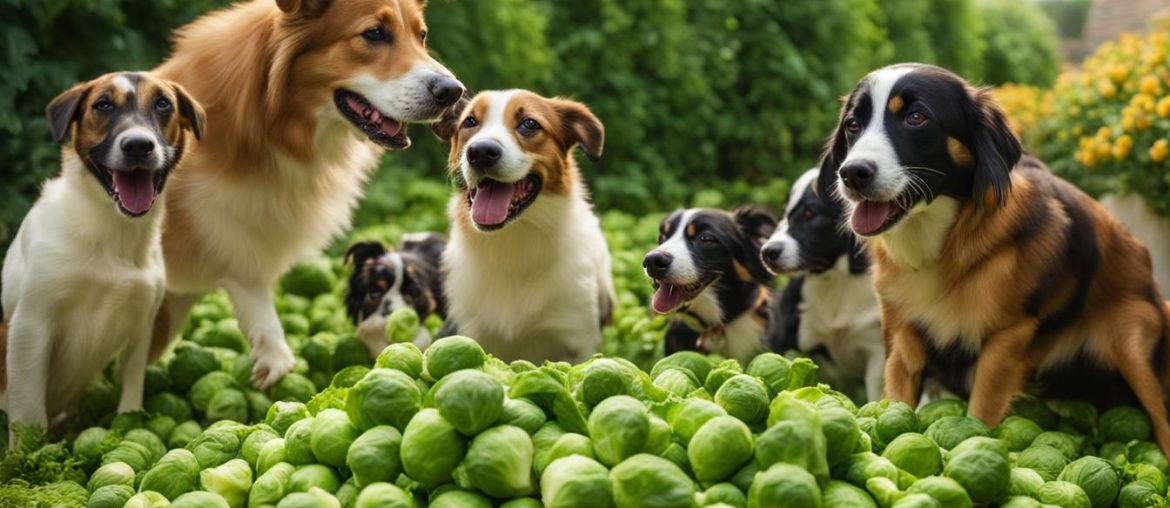When it comes to the health and well-being of our furry friends, nutrition plays a crucial role. As a concerned dog owner, you may be wondering if Brussels sprouts are a safe and beneficial addition to your dog’s diet. In this article, I will provide you with veterinary insight on the topic, exploring the nutritional value of Brussels sprouts for dogs and the potential risks involved.
Brussels sprouts can indeed be a healthy addition to your dog’s diet when cooked properly and given in moderation. These vegetable gems are packed with essential vitamins, fiber, and nutrients, including vitamin C and vitamin K, which can contribute to your dog’s overall health. However, it’s crucial to exercise caution, as Brussels sprouts can cause digestive issues like gas and bloating if consumed in large quantities or prepared incorrectly.
It’s always advisable to consult with a veterinarian before introducing Brussels sprouts or any new food to your dog’s diet. They can provide personalized guidance based on your dog’s specific needs and health condition.
Key Takeaways:
- Brussels sprouts can be safely fed to dogs when cooked properly and given in moderation.
- These vegetables are rich in vitamins, fiber, and nutrients that can be beneficial for dogs’ overall health.
- However, exercise caution as Brussels sprouts can cause digestive issues like gas and bloating if eaten in large quantities or prepared incorrectly.
- Consult with a veterinarian before introducing Brussels sprouts or any new food to your dog’s diet.
- Every dog is different, so it’s important to monitor for any signs of digestive upset or adverse reactions when introducing Brussels sprouts.
Are Brussels Sprouts Safe for Dogs to Eat?
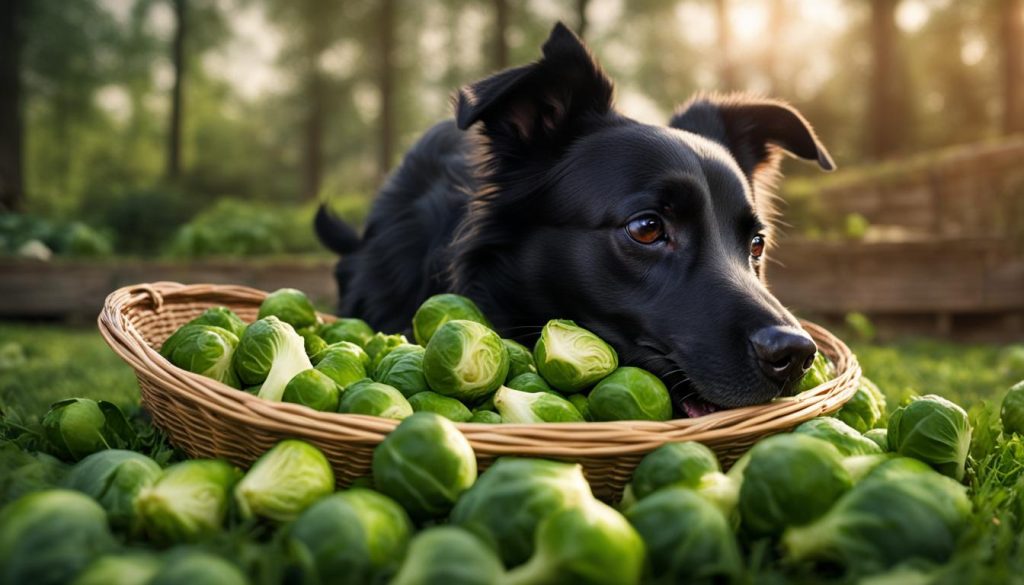
Brussels sprouts can be a safe and nutritious addition to a dog’s diet when prepared properly and fed in moderation. These vegetables offer various health benefits and nutrients that can contribute to a dog’s overall well-being. However, it’s important to take some precautions to ensure the safety and digestive health of your furry friend.
When feeding Brussels sprouts to dogs, it’s crucial to cook them plain without any harmful ingredients like garlic, onions, or salt. These additives can be toxic to dogs and should be avoided. It’s best to steam or roast Brussels sprouts until they are tender, making them easier for dogs to chew and digest. Remember to cut them into small, well-cooked pieces to prevent any choking hazards or intestinal blockage.
As with any new food, it’s advisable to introduce Brussels sprouts to your dog’s diet gradually. Start by offering a small, plain cooked piece as a treat or food topper. Monitor your dog closely for any signs of digestive upset such as gas, bloating, vomiting, or diarrhea. If you notice any adverse reactions, it’s recommended to reduce the amount of Brussels sprouts given or consult with a veterinarian for further guidance.
The Benefits of Brussels Sprouts for Dogs
Brussels sprouts provide dogs with several health benefits due to their nutritional content. These vegetables are rich in fiber, which can support a healthy digestive system. Additionally, Brussels sprouts contain essential vitamins such as vitamin C and vitamin K, which contribute to a dog’s immune function and bone health. The antioxidants present in Brussels sprouts also offer potential anti-inflammatory properties, which can help reduce the risk of certain diseases.
Potential Risks of Feeding Brussels Sprouts to Dogs
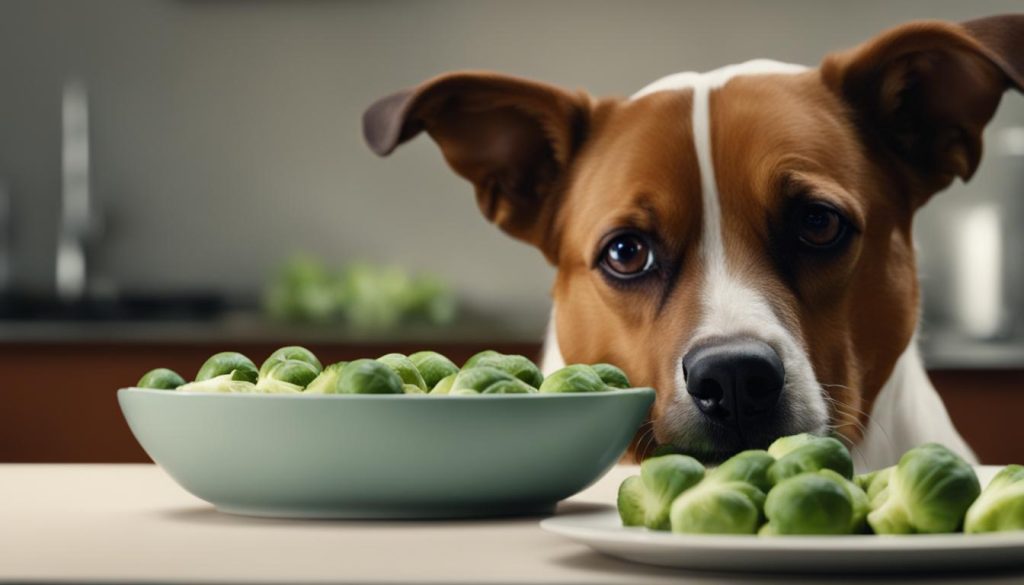
While Brussels sprouts offer health benefits, they can also pose certain risks for dogs if not fed properly. These vegetables contain a type of carbohydrate called raffinose, which can be difficult for dogs (and humans) to digest. Consuming large quantities of Brussels sprouts or eating them raw can lead to excessive gas and bloating in dogs. Additionally, feeding whole Brussels sprouts to dogs can be a choking hazard or cause intestinal obstruction. It’s important to feed dogs small, well-cooked pieces of Brussels sprouts and avoid feeding them raw or frozen Brussels sprouts.
To ensure the safety of your furry friend, it’s crucial to be aware of the potential risks associated with feeding Brussels sprouts. Here are some key considerations:
1. Digestive Upset:
The raffinose present in Brussels sprouts can cause digestive issues in dogs if consumed in large quantities or eaten raw. Gas, bloating, and discomfort are common symptoms of digestive upset. To avoid these issues, it is recommended to feed Brussels sprouts in moderation and in cooked form.
2. Choking Hazard:
Feeding whole Brussels sprouts to dogs can be dangerous as they pose a choking hazard. Dogs should always be given small, well-cut pieces of Brussels sprouts to minimize the risk of choking or any other related complications.
3. Intestinal Obstruction:
Dogs that ingest large pieces of raw or cooked Brussels sprouts may be at risk of developing intestinal obstruction. This occurs when the sprouts block the passage of food through the intestines. It is vital to chop Brussels sprouts into small, easily digestible pieces for your dog’s safety.
Overall, while Brussels sprouts can be incorporated into a dog’s diet in moderation, it is essential to take precautions to prevent any potential risks. By feeding cooked, well-cut Brussels sprouts in appropriate portions, you can enhance your dog’s diet with the nutritional benefits of these vegetables without compromising their health and well-being.
How to Safely Prepare Brussels Sprouts for Dogs
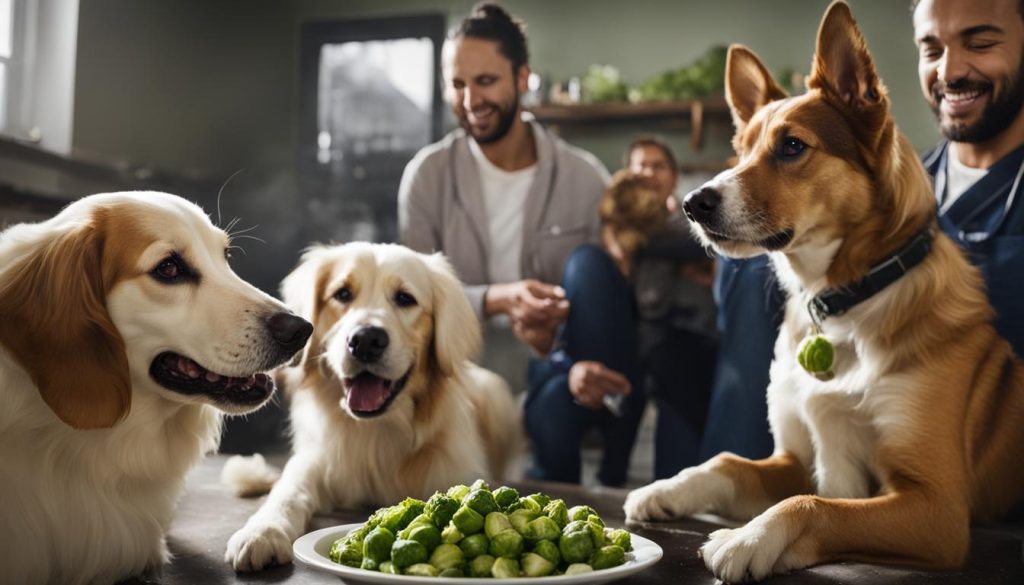
When incorporating Brussels sprouts into a dog’s diet, it is crucial to prepare them safely to ensure the well-being of our furry friends. Here are essential steps to follow:
1. Cooking Methods:
Brussels sprouts should be either steamed or roasted until they are tender. These methods help soften the vegetables and make them easier for dogs to digest. It is important to note that raw or frozen Brussels sprouts should be avoided, as they can be bitter and pose a choking hazard or cause intestinal blockage.
2. Proper Size:
Cutting Brussels sprouts into bite-sized pieces is vital to prevent choking and ensure safe consumption. This also makes it easier for dogs to eat and digest the vegetables without any issues. Always make sure to remove any tough outer leaves that may be difficult for dogs to chew.
3. Seasoning and Ingredients:
When preparing Brussels sprouts for dogs, it is crucial to avoid adding any seasonings, oils, or ingredients that can be harmful to their health. Ingredients like garlic or salt should not be included, as they can be toxic to dogs. Keep the preparation simple and plain, focusing on the natural flavors of the vegetables.
4. Cooling Before Serving:
After cooking the Brussels sprouts, allow them to cool down completely before giving them to your dog. This not only prevents any potential burns but also ensures that the vegetables are at a safe temperature for consumption.
By following these guidelines, you can safely incorporate Brussels sprouts into your dog’s meals or use them as a healthy treat. Remember, it’s always best to consult with a veterinarian before introducing any new food to your dog’s diet, especially if they have specific dietary restrictions or health conditions.
Feeding Brussels Sprouts in Moderation
When it comes to incorporating Brussels sprouts into a dog’s diet, moderation is key. While these vegetables offer various health benefits, it’s important to introduce them gradually and in appropriate portions. Start by incorporating a small, cooked, plain bite of Brussels sprouts into your dog’s regular food as a treat. Keep a close eye on your dog for any signs of digestive upset, such as vomiting, flatulence, abdominal pain, or diarrhea. If any of these symptoms occur, it’s advisable to reduce the amount of Brussels sprouts given.
Portion guidelines for feeding Brussels sprouts to healthy, adult dogs can range from a teaspoon or less for extra-small dogs up to a quarter cup or less for extra-large dogs. However, it’s crucial to consult with a veterinarian for specific portion recommendations based on your individual dog’s size, breed, and overall health. Every dog is unique, and their dietary needs may vary.
Remember, Brussels sprouts should only be a part of a balanced and varied diet for your dog. Along with Brussels sprouts, other safe vegetables for dogs include steamed or roasted pumpkin, carrots, broccoli, cauliflower, and bell peppers. Avoid feeding dogs onions, garlic, chives, or any toxic vegetables, and always consult with a veterinarian before introducing new foods to your dog’s diet, especially if they have specific dietary restrictions or health conditions.
| Portion Size | Dog Size |
|---|---|
| Teaspoon or less | Extra-small dogs |
| Up to a quarter cup or less | Extra-large dogs |
Other Safe Vegetables for Dogs
Aside from Brussels sprouts, there are several other vegetables that are safe and beneficial for dogs. Incorporating a variety of vegetables into their diet can provide dogs with additional vitamins, minerals, and fiber. Here are some examples of other safe vegetables for dogs:
- Pumpkin: Steamed or roasted pumpkin is not only safe for dogs to eat, but it can also aid in digestion and provide a good source of fiber.
- Carrots: These crunchy vegetables are rich in beta-carotene, which is converted into vitamin A in a dog’s body. Carrots can be given raw or cooked as a tasty and nutritious treat.
- Broccoli: This vegetable is packed with vitamins and minerals, including vitamin C and calcium. It’s best to feed dogs cooked broccoli in small, bite-sized pieces.
- Cauliflower: Like broccoli, cauliflower is a nutritious vegetable that can be fed to dogs when cooked. It contains antioxidants and is a good source of fiber.
- Bell Peppers: These colorful vegetables are low in calories and high in vitamins A and C. Bell peppers can be chopped into small pieces to serve as a healthy snack for dogs.
When introducing new vegetables to a dog’s diet, it’s important to do so gradually and in moderation. Monitoring for any signs of digestive upset is key, as some dogs may have sensitivities to certain vegetables. Additionally, it’s always a good idea to consult with a veterinarian before making any significant changes to a dog’s diet, especially if they have specific dietary restrictions or health conditions.
Table: Safe Vegetables for Dogs
| Vegetable | Nutritional Benefits | Preparation |
|---|---|---|
| Pumpkin | High in fiber and aids digestion | Steamed or roasted |
| Carrots | Rich in beta-carotene and vitamin A | Raw or cooked |
| Broccoli | Contains vitamin C and calcium | Cooked in bite-sized pieces |
| Cauliflower | Antioxidant-rich and high in fiber | Cooked |
| Bell Peppers | Low in calories and high in vitamins A and C | Chopped into small pieces |
The Health Benefits of Brussels Sprouts for Dogs

Brussels sprouts offer various health benefits for dogs when fed in moderation. These vegetables are rich in vitamins and nutrients that can support dogs’ overall health and well-being.
The fiber in Brussels sprouts helps maintain a healthy digestive system, while vitamin C and vitamin K contribute to healthy bones, blood clotting, and immune function. The antioxidants present in Brussels sprouts can provide anti-inflammatory properties and potentially reduce the risk of certain diseases.
Feeding Brussels sprouts to dogs can be a nutritious way to incorporate additional vitamins, minerals, and fiber into their diet. However, it’s important to remember that every dog is different, and it’s always best to consult with a veterinarian before making any significant dietary changes for a dog.
Key Health Benefits of Brussels Sprouts for Dogs:
- Rich in fiber for a healthy digestive system
- Good source of vitamin C for immune support
- Contains vitamin K for healthy bones and blood clotting
- Provides antioxidants with potential anti-inflammatory properties
By incorporating Brussels sprouts into a dog’s diet, pet owners can offer their furry friends a variety of nutritional benefits. However, it’s crucial to introduce Brussels sprouts gradually and monitor for any signs of digestive upset. Feeding Brussels sprouts in small, well-cooked pieces and avoiding any harmful seasonings or ingredients is key to ensuring the safety and health of dogs.
Precautions When Feeding Brussels Sprouts to Dogs
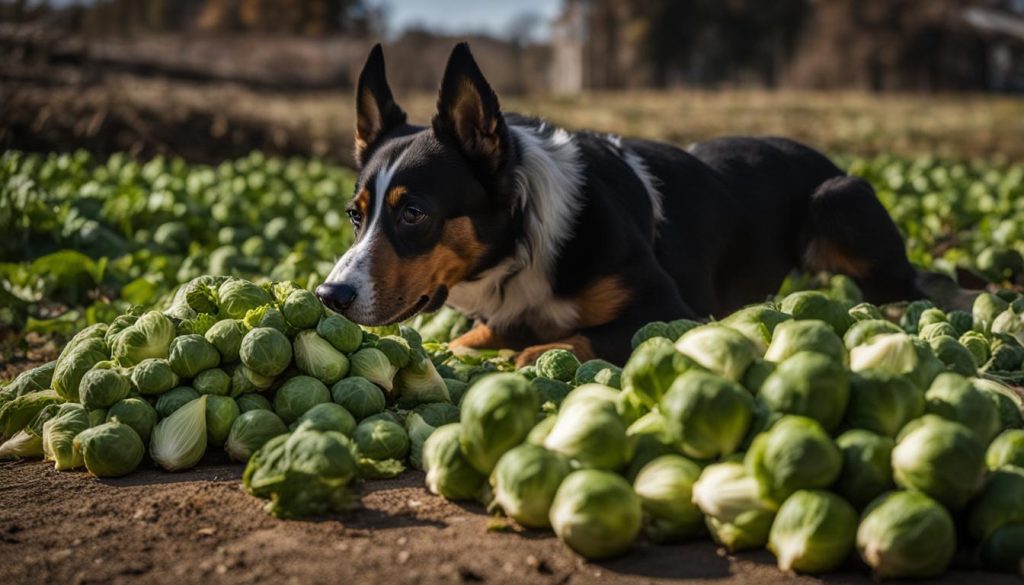
When it comes to feeding Brussels sprouts to dogs, there are a few precautions to keep in mind to ensure their safety and well-being. While Brussels sprouts themselves are safe for dogs to eat, it’s important to be aware of certain considerations to avoid any potential risks.
Firstly, it’s advised to avoid feeding dogs the stalks of Brussels sprouts. The stalks can be difficult to digest and may cause gastrointestinal upset in dogs. Instead, focus on feeding them the leaves and sprouts, which are easier for them to handle.
Additionally, it’s crucial to cut the Brussels sprouts into small, well-cooked pieces before offering them to your dog. Feeding them the whole vegetable can be a choking hazard or even lead to an intestinal obstruction, which can be dangerous for their health. By cutting the Brussels sprouts into manageable pieces, you can ensure safe consumption for your furry friend.
| Precautions When Feeding Brussels Sprouts to Dogs | |
|---|---|
| 1 | Avoid feeding dogs the stalks of Brussels sprouts. |
| 2 | Cut the Brussels sprouts into small, well-cooked pieces. |
| 3 | Avoid feeding dogs the whole Brussels sprout to prevent choking or intestinal obstruction. |
By following these precautions, you can ensure that your dog can enjoy the nutritional benefits of Brussels sprouts without any potential risks. Remember, it’s always a good idea to consult with a veterinarian before introducing any new foods to your dog’s diet, especially if they have specific dietary restrictions or health conditions.
Wrapping Up
To sum up, incorporating Brussels sprouts into dogs’ meals can contribute to their overall health. These vegetables are packed with essential vitamins, fiber, and nutrients that support dogs’ well-being. However, it’s important to remember that moderation is key and to be mindful of potential digestive issues such as gas or bloating. Feeding Brussels sprouts in small, well-cooked pieces and avoiding harmful seasonings or ingredients ensures the safety and health of dogs.
When preparing Brussels sprouts for dogs, it’s best to steam or roast them until tender and cut them into bite-sized pieces. This makes it easier for dogs to consume and digest. Always avoid feeding dogs the whole Brussels sprout, as it can be a choking hazard or lead to intestinal obstruction. By following these precautions and consulting with a veterinarian, Brussels sprouts can be a nutritious addition to a dog’s diet.
Remember that individual dogs may have specific dietary restrictions or health conditions, so it’s essential to seek professional advice before making any significant dietary changes. By considering the health benefits and precautions associated with feeding Brussels sprouts to dogs, you can provide them with a well-rounded diet that promotes their overall well-being.
FAQ
Are Brussels sprouts good for dogs?
Yes, Brussels sprouts can be beneficial for dogs as they are rich in vitamins, fiber, and nutrients.
Can dogs eat Brussels sprouts?
Yes, as long as they are cooked plain and prepared without any harmful ingredients, dogs can safely eat Brussels sprouts.
What are the potential risks of feeding Brussels sprouts to dogs?
Feeding Brussels sprouts in large quantities or raw can cause digestive issues such as gas and bloating in dogs. It can also be a choking hazard or cause intestinal obstruction.
How should Brussels sprouts be prepared for dogs?
Brussels sprouts should be steamed or roasted until tender and then chopped into small, well-cooked pieces for dogs to easily eat and digest.
How much Brussels sprouts should I feed my dog?
Portion guidelines for healthy adult dogs range from a teaspoon or less for extra-small dogs up to a quarter cup or less for extra-large dogs. However, it’s best to consult with a veterinarian for specific portion recommendations for your dog.
What other vegetables are safe for dogs to eat?
Other safe vegetables for dogs include pumpkin, carrots, broccoli, cauliflower, and bell peppers. It’s important to avoid toxic vegetables like onions, garlic, and chives.
What are the health benefits of Brussels sprouts for dogs?
Brussels sprouts offer vitamins, fiber, and nutrients that can support dogs’ overall health, including a healthy digestive system, strong bones, blood clotting, and immune function.
Are there any precautions when feeding Brussels sprouts to dogs?
Yes, it’s important to avoid feeding dogs the whole Brussels sprout, as it can be a choking hazard or cause intestinal obstruction. Dogs should only consume the leaves and sprouts, while the stalks should be avoided.


